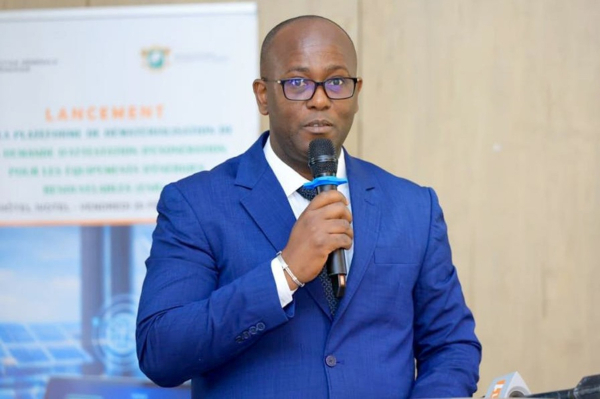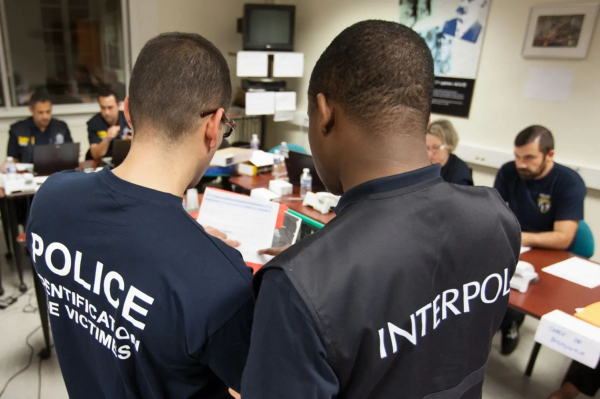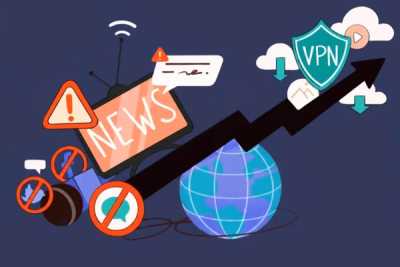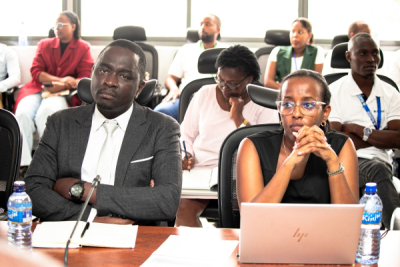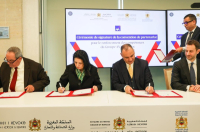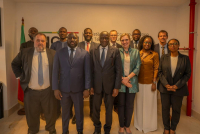
Tech (1143)
-
Authorities launched an online platform to process VAT, banking tax and customs duty exemptions for renewable energy equipment.
-
Importers can now submit and track applications digitally through a system developed with the Single Window for Foreign Trade.
-
Ivory Coast targets 42% to 45% renewable energy in its power mix by 2030.
The Ivorian administration has intensified its transition toward e-government. Authorities have expanded digital public services, including recently launched sectoral platforms, as part of a strategy to modernize public action and facilitate user access to administrative procedures.
#Économie | Modernisation de l'administration énergétique: la plateforme digitalisée de demande d'Attestation d'Exonération de la TVA officiellement lancée
— Gouvernement de Côte d'Ivoire (@Gouvciofficiel) February 21, 2026
Abidjan, le 20 février 2026- Le directeur général de l'Énergie, Narcisse Kalifa Éhouman, a lancé officiellement, le… pic.twitter.com/WkzpBQLmz4
The Directorate General of Energy launched on February 20 in Abidjan an online platform dedicated to applications for exemptions from value-added tax (VAT), the banking operations tax (TOB) and customs duties on renewable energy equipment. Officials designed the initiative to simplify administrative procedures, reduce processing times and secure the review of files linked to clean energy investments.
Director General of Energy Narcisse Kalifa Éhouman stated that the platform represents a major step forward in the digital transformation of the energy administration. “Thanks to this platform, developed in close collaboration with the Single Window for Foreign Trade, importers will now be able to submit their applications online, track the progress of their files in real time, and interact with the administration in a more fluid, efficient, and transparent manner.” he explained.
Authorities expect the digitalization of these procedures to shorten review times, improve traceability of administrative decisions and strengthen the reliability of file assessments. By centralizing exemption requests, the government aims to lower investment costs for solar, wind and hybrid projects while providing a clearer operational framework for industry players.
The launch forms part of Ivory Coast’s broader strategy to modernize public administration through the dematerialization of services. In recent years, authorities have accelerated digitalization by automating foreign trade formalities, expanding online tax services and gradually integrating digital tools into the management of economic public services.
The initiative coincides with the acceleration of the national energy transition. Ivory Coast aims to raise the share of renewable energy in its electricity mix to between 42% and 45% by 2030. Authorities are developing several solar and energy infrastructure projects to support growing electricity demand.
The digitalization of exemptions for renewable energy equipment aligns with a wider e-government drive to enhance administrative transparency, improve the business climate and facilitate private investment. The Ivorian state plans to progressively extend dematerialization to other sectoral procedures, enabling centralized and online monitoring of applications.
This article was initially published in French by Samira Njoya
Adapted in English by Ange J.A de Berry Quenum
- Interpol arrested 651 suspects and recovered more than $4.3 million during Operation Red Card 2.0.
- Authorities identified 1,247 victims and estimated losses at more than $45 million.
- Cybercrime accounts for over 30% of reported offenses in parts of West and East Africa, Interpol says.
Interpol said it arrested 651 people and recovered more than $4.3 million during Operation Red Card 2.0, which authorities conducted between Dec. 8, 2025 and Jan. 30, 2026 across 16 African countries.
Interpol said law enforcement agencies targeted infrastructure and actors behind high-yield investment scams, mobile money fraud and fraudulent loan applications. Authorities identified 1,247 victims and estimated total losses at more than $45 million.
“These organized cybercriminal syndicates inflict devastating financial and psychological harm on individuals, businesses, and entire communities with their false promises. Operation Red Card underscores the importance of collaboration in the fight against transnational cybercrime.” said Neal Jetton, director of cybercrime at Interpol.
Officials carried out targeted operations in several countries. In Nigeria, law enforcement agencies closed more than 1,000 fraudulent accounts and confiscated a residential property that suspects used as an operational base. In Kenya, officers arrested 27 people linked to fraudulent investment schemes that perpetrators promoted through messaging platforms and social networks, where they lured victims with false returns and falsified account statements. In Côte d’Ivoire, authorities arrested 58 people and seized 240 mobile phones, 25 laptops and more than 300 SIM cards during an operation that targeted mobile loan fraud affecting mainly vulnerable populations.
Interpol said Operation Red Card 2.0 followed an earlier phase conducted between November 2024 and February 2025. Authorities arrested about 300 cybercriminals and seized nearly 2,000 devices in seven African countries during the previous operation. Authorities also recorded several thousand victims of mobile banking scams, fraudulent investments and messaging-based fraud.
Interpol said the latest operation took place against a backdrop of rising cybercrime across Africa. The organization attributed the surge to rapid digital adoption and gaps in legal frameworks, training and technical resources. According to Interpol’s African Cyberthreat Assessment Report, cyber-related crime now accounts for more than 30% of reported offenses in some parts of West and East Africa, while most countries call for significantly stronger enforcement capacity.
Financial losses linked to cybercrime also threaten African economies. Estimates compiled from international reports show that cybercrime cost various countries on the continent at least $3 billion between 2019 and 2025. Analysts said total costs likely exceed that figure when they include indirect losses such as productivity declines, reputational damage and system recovery expenses.
Samira Njoya
- Orange executives say digital transformation strengthens competitiveness for Ivorian companies.
- Cyberattacks on Ivorian SMEs reached 2.8 million incidents in 2022, up more than 39% year-on-year.
- Orange Business CI offers cybersecurity diagnostics, penetration testing and managed security services to address rising risks.
Digital transformation now represents a strategic lever of competitiveness for Ivorian companies. Executives delivered that message during the 20th edition of “Orange Business Live,” which took place on Feb. 19 under the theme “Innovation and Digital Transformation: Accelerating the Competitiveness of Ivorian Companies.”
Pacôme Boidi, senior manager for B2B coordination, and Fitzgerald Bony, deputy director of B2B operations at Orange CI, led the event.
Executives said digital solutions improve productivity, lower operating costs and optimize internal processes. They urged local companies to integrate innovation into their core strategies to strengthen their positioning in an increasingly competitive market.
However, Fitzgerald Bony said companies must adapt digital priorities to sector dynamics. He said the absence of digital tools does not necessarily penalize companies in the short term if competitors have not adopted them. He added that companies must align with digital standards in sectors where competitors already use such tools to preserve competitiveness.
Pacôme Boidi stressed that global connectivity has expanded competition beyond national borders. “The competition is on. Know your industry, dare to take the plunge, and get involved in transformative projects. Try to be that strategic compass, and remember that Orange is here to support you,” he said.aid, addressing Ivorian businesses.
Digital Transformation Challenges: Human Factor and Cybersecurity
Speakers said managerial alignment and change management determine the success of digital transformation projects. They said companies must define a clear strategic vision and demonstrate strong leadership to sustain transformation efforts. They said value depends not on the tool itself but on its ability to address a concrete and priority business need. They recommended a gradual approach supported by quick and measurable results to secure staff engagement.
Speakers also highlighted the role of young graduates in the evolving ecosystem. They said training, startup support and continuous skills development strengthen competitiveness. They said massive open online courses (MOOCs), university partnerships and structured internships can build a more resilient digital ecosystem.
However, executives acknowledged that digitalization exposes companies to new cybersecurity risks. In a study published in October 2025, Orange Business CI said small and medium-sized enterprises face heightened exposure to cyberattacks. The study said more than 27,500 Ivorian SMEs suffered 2.8 million cyberattacks in 2022, which marked an increase of more than 39% compared with the previous year. The study said 81% of SMEs have never provided or received cybersecurity training, while 66% never discuss cybersecurity at board level.
In 2024, National Information Systems Security Agency recorded more than 12,100 cybercrime cases. The agency said cybercrime has increased steadily for several years. The agency said threats affect individuals, companies, local authorities and state institutions. The agency said cybercriminals exploit accelerated digital transformation, weak cybersecurity culture and the growing use of smartphones, connected devices and online services.
Against that backdrop, Orange Business CI offers cybersecurity tools that cover multiple layers of corporate protection. The company provides assessment services such as cyber diagnostics, which identify organizational and technical vulnerabilities and define action plans. The company also provides “pentest” services that conduct technical intrusion tests and deliver detailed audit reports.
The company complements those services with operational solutions. The offer includes a managed security services provider (MSSP) cloud platform that secures internet access, mobile threat protection (MTP) tools, a server and workstation monitoring and incident response solution (MicroSOC), and a mobile device management (MDM) service that controls and secures professional data on smartphones. The company said the integrated approach addresses the diversification of cyber risks facing businesses.
This article was initially published in French by Isaac K. Kassouwi
Adapted in English by Ange J.A de Berry Quenum
- Senegal will equip traffic regulation units with 2,500 body cameras.
- Authorities will link the devices to digital ticketing systems to curb cash handling and improve fine collection.
- The government aims to reduce corruption and strengthen traceability of roadside interventions.
Senegal will equip its traffic regulation units with 2,500 portable cameras to strengthen oversight of roadside checks and reduce corruption, Interior Minister Mouhamadou Bamba Cissé said.
The minister announced the measure on Feb. 18 before the National Assembly during the review of a draft law aimed at professionalizing the private security sector.
Cissé said the body cameras will record interactions between officers and road users. He said the recordings will provide factual evidence in the event of disputes and improve traceability of public road interventions. He said authorities aim to improve operational practices and enhance service quality for citizens.
Modernizing Road Control Through Digital Tools
Authorities will connect the body cameras to personal digital assistants (PDAs) that the ministry already uses to manage traffic fines and dematerialize procedures. Officials said the integration will standardize the processing of infractions, limit cash handling and ensure direct payment of fines to the public treasury. Authorities said the system will strengthen financial flow management and improve transparency.
The project forms part of a broader modernization drive within the security forces. The administration has introduced digital tools in recent years to manage traffic and roadside controls. Officials said mobile technologies will improve operational efficiency and strengthen the reliability of infraction data collection.
A Technology Already Tested in Several Countries
Security services across North America and Europe have widely adopted body cameras as tools that support procedures and evidence management. Several studies conducted in those regions show improved compliance with protocols during checks and reduced incidents linked to interventions.
In Africa, South Africa launched a program in 2023 to equip selected police and traffic officers with body cameras to improve monitoring of interventions. Nigeria and Kenya have also initiated discussions on integrating such devices into public security systems.
Senegal’s decision to combine body cameras and PDAs signals an effort to align technological innovation with administrative reform. Authorities said they will link the devices to a digital infraction management circuit to strengthen procedures, optimize fine collection and modernize the operational environment of security forces.
Officials said the system’s effectiveness will depend on officer training, a clear legal framework governing the use of recordings and the integration of the technology into a coherent management structure. Policymakers in other countries that adopted similar solutions have faced similar implementation challenges.
This article was initially published in French by Samira Njoya
Adapted in English by Ange J.A de Berry Quenum
- Internet shutdowns cost sub-Saharan Africa $1.11 billion in 2025, according to Top10VPN.
- Governments imposed 24,276 hours of disruptions, affecting 116.1 million users across the region.
- The Democratic Republic of Congo, Sudan, and Cameroon recorded the highest economic losses.
Internet shutdowns and platform restrictions cost sub-Saharan Africa $1.11 billion in 2025, according to the Global Cost of Internet Shutdowns report published by Top10VPN. Globally, such disruptions generated $19.7 billion in losses, highlighting a growing scale of digital interference.
In sub-Saharan Africa, 2025 losses declined from $1.56 billion in 2024, but the financial impact remained significant. Authorities enforced shutdowns for 24,276 hours, and the disruptions affected 116.1 million internet users. Governments implemented most restrictions during elections, protests, school examinations, and military coups.
Most affected countries
The Democratic Republic of the Congo recorded the highest losses in Africa, with $67.2 million in economic damage. Authorities disrupted connectivity for 1,008 hours, affecting 34.7 million users.
Sudan reported $66.6 million in losses over 2,148 hours of shutdowns, despite affecting a smaller number of users estimated at 14.9 million. The duration of the interruptions amplified the economic impact.
Cameroon incurred $40.5 million in losses, as authorities disrupted access for 52 hours, affecting 12.6 million users.
Governments frequently targeted social media platforms such as Twitter, Telegram, TikTok, Facebook, and WhatsApp. Authorities used these restrictions to limit communication, commerce, and access to information. In some cases, governments imposed intentional slowdowns that made multimedia content and live broadcasts nearly inaccessible.
How are these losses calculated?
The report said analysts calculated the economic cost of shutdowns using the Netblocks Cost of Shutdown Tool, developed by Netblocks and based on a methodology designed by the Brookings Institution, adapted for sub-Saharan Africa.
Analysts estimated losses using digital GDP, disruption duration, and the number of affected users. Researchers sourced data from the World Bank and official government statistics. The report said analysts applied social media restrictions to the entire internet user base because platform bans disrupt overall access, including for users who do not actively use blocked services.
A major obstacle to digital transformation
These losses illustrate the economic cost of internet shutdowns across sub-Saharan Africa. As governments invest in digital transformation to close development gaps, deliberate connectivity disruptions continue to undermine innovation and competitiveness.
Shutdowns also reduce revenues for telecom operators, digital-dependent businesses, and households, and they limit growth potential in an increasingly connected global economy.
In a statement published in January 2026, UNESCO said access to the internet represents a pillar of freedom of expression and a core component of democratic participation. The organization urged governments to adopt policies that promote connectivity rather than impose restrictions.
Samira Njoya
- Burundi launched a web-based single window to manage import permits and online payments.
- The platform integrates pharmaceutical controls through the ABREMA module and connects multiple regulators.
- Authorities made the system mandatory as part of customs and public-sector digital reforms.
The Burundi Revenue Authority (OBR), with support from TradeMark Africa and the United Nations Conference on Trade and Development, presented the new web-based version of the Electronic Single Window for import permit management on February 17, in Bujumbura.
The system now includes the ABREMA module, which covers pharmaceutical and medical products.
Ce mardi 17 février 2026, l’@OBR_BI a procedé à la mise en production et exploitation definitive du module web #ABREMA, une plateforme numérique dédiée à la facilitation de l’importation des produits médicamenteux via le guichet unique électronique.https://t.co/JFCxqmPTRx pic.twitter.com/grqyGfB9gU
— Office Bdais des Recettes (@OBR_BI) February 17, 2026
The platform allows importers and exporters to submit applications, track file progress in real time, and complete payments online without physical travel. The system operates as an integrated platform that centralizes procedures with the Burundian Medicines and Food Regulatory Authority, which oversees pharmaceutical quality and compliance, the Ministry of Environment, Agriculture, and Livestock for sanitary and phytosanitary certifications, and the OBR for final authorization clearance.
The platform features an interactive dashboard that enables users to monitor application status at any time and automatically calculate fees, including options for foreign-currency payments.
Authorities aligned the modernization with Burundi’s public-sector digital transformation policy, which seeks to shorten administrative delays, strengthen trade traceability, and enhance national competitiveness. The reform also extends ongoing efforts to integrate the single window with the ASYCUDA customs system as part of the transition toward a Single Customs Territory.
Authorities made use of the platform exclusive, and all pharmaceutical importers must now complete procedures through the electronic system.
The digital single window also improves coordination between regulatory agencies and businesses while supporting reforms aimed at integrating Burundi into a regional single customs territory. Countries such as Rwanda, Kenya, Uganda, and Zimbabwe also operate electronic single windows interconnected with online customs systems.
The ASYCUDA WORLD system, developed with UNCTAD support, operates in more than 100 economies and helps reduce customs clearance times and administrative costs.
This article was initially published in French by Samira Njoya
Adapted in English by Ange J.A de Berry Quenum
- Morocco signed a partnership agreement with AXA to strengthen national skills in data, artificial intelligence and digital technologies.
- The program supports Morocco’s 2030 digital strategy, which targets training 100,000 young people annually and creating 240,000 tech jobs by 2030.
- Universities and public higher education institutions will collaborate with industry to align training with labor market needs.
The Ministry of Industry and Trade, the Ministry of Higher Education, Scientific Research and Innovation, and the Ministry of Digital Transition and Administrative Reform signed the agreement with the French insurance group AXA on February 16 in Rabat. The agreement aims to enhance national expertise in data, artificial intelligence and digital technologies.
In recent months, Morocco has multiplied partnerships to expand digital skills development. Alongside public stakeholders, technology groups such as Samsung and Mistral AI have supported these efforts to strengthen technical capabilities.
The framework provides for the deployment of initial and continuing training programs, the development of work-study tracks and support for research and development projects linked to digital transformation. The program also aims to anticipate demand for specialized profiles in areas such as cybersecurity, cloud computing, DevOps and software testing while ensuring closer alignment between training supply and labor market needs.
Under the agreement, universities and public higher education institutions will collaborate with schools overseen by the Ministry of Industry and Trade to strengthen links between academia and the private sector. The partnership also provides for internships, professional immersion schemes and programs designed to facilitate the integration of young graduates into technology sectors.
The agreement forms part of Morocco’s national digital transformation strategy through 2030, which positions human capital development as a central lever of economic competitiveness. The roadmap prioritizes digital skills training, the expansion of artificial intelligence and the creation of qualified jobs.
Morocco plans to train 100,000 young people annually in digital skills and to generate 240,000 jobs in the sector by 2030 to meet rising demand for specialized talent.
The Ministry of Digital Transition said the partnership should help structure a national ecosystem capable of anticipating technological shifts and positioning Morocco as a regional hub for technology professions in support of digital sovereignty and economic competitiveness.
This article was initially published in French by Samira Njoya
Adapted in English by Ange J.A de Berry Quenum
- Three start-ups from Jordan, Madagascar and Tunisia won the 2025 international final held in Casablanca on February 4.
- Orange awarded a total of 50,000 euros and support through its Orange Digital Centers network.
- The 2025 edition trained 369 young innovators from 14 countries, and 56 Startup4Good projects emerged.
The international Orange Summer Challenge competition, which promotes responsible entrepreneurship in Africa and the Middle East, announced the winners of its third edition during a final held on February 4 in Casablanca, Morocco. The jury recognized three start-ups for their potential impact in occupational safety, sustainable energy and water resource management.
Jordan-based SafeGuard secured first prize with an intelligent workplace accident prevention device that uses risk detection technology. Madagascar-based GasNika ranked second with a biogas production solution that converts organic waste into biological fertilizer. Tunisia-based DripIn completed the podium with a connected solution that uses artificial intelligence to detect water leaks and optimize consumption.
Organizers granted the winners financial, technical and commercial support through the Orange Digital Centers network, and they allocated a total prize of 50,000 euros to accelerate project development.
For the 2025 edition, 369 young innovators from 14 countries completed an intensive support program that combined training, mentoring and coaching. Orange Afrique et Moyen-Orient deployed the program with support from technology and institutional partners, including Amazon Web Services, Meta, the United Nations Development Programme, The Hashgraph Association and Dar Blockchain. The program generated 56 projects under the Startup4Good theme across sectors such as environment, health, education and agriculture.
According to Ben Cheick Haidara, Deputy Chief Executive Officer and Chief Operating Officer of Orange Afrique et Moyen-Orient, the 2025 edition reflects the group’s ambition to position Orange Digital Centers as open innovation platforms focused on social and environmental impact. “Bien plus qu’une compétition, ce programme permet aux jeunes entrepreneurs de développer des solutions technologiques, notamment basées sur l’intelligence artificielle, pour répondre concrètement aux défis sociétaux et environnementaux. À travers les Orange Digital Centers, Orange s’engage durablement aux côtés de la jeunesse pour faire émerger une innovation à fort impact en Afrique et au Moyen-Orient,” he said.
Samira Njoya
- Senegal aligned the Digital Economy Acceleration Project (PAENS) with its national digital transformation agenda for 2026.
- The government increased the Ministry of Digital Affairs’ 2026 budget by 38.7% to CFA81.06 billion ($146 million), with nearly 60% allocated to investment.
- The World Bank committed CFA95.05 billion to support connectivity, digital public services and regulatory reforms.
During the World Bank’s portfolio review in Senegal, the Minister of Communication, Telecommunications and Digital Affairs met on Thursday, February 12 in Dakar with Ousmane Diagana, Vice President of the World Bank for Western and Central Africa, who toured the country with his teams. The meeting allowed officials to present Senegal’s integrated digital vision and to review the main pillars of the New Deal Technologique, the national roadmap for digital transformation.
Officials placed the Digital Economy Acceleration Project in Senegal (PAENS) at the center of discussions. Authorities recently aligned the project with the national agenda after several months of detailed structuring. The updated framework now integrates concrete priorities, including the deployment of an integrated public financial management system, the strengthening of cybersecurity capabilities, the establishment of a sovereign government cloud and the development of artificial intelligence use cases.
Moreover, participants validated operational milestones scheduled for the first half of 2026. Authorities will launch a tender to connect underserved “white zones,” particularly in the groundnut basin and Lower Casamance. Project managers will start construction of the integrated accounting module of the SIGIF public finance system, and health officials will deploy an electronic patient record system financed under PAENS.
Rising Budget Allocation to Support Digital Push
Senegal increased the budget allocation dedicated to digital development to support these objectives. The Ministry of Digital Affairs secured CFA81.06 billion (about $146 million) for 2026, and the government raised the allocation by nearly 38.7% compared with 2025. The ministry allocated nearly 60% of the envelope to investment, particularly in infrastructure, cybersecurity and digital economy development.
All these initiatives align with the New Deal Technologique that Senegalese authorities launched in February 2026 to position digital technology as a driver of sovereignty and development. In this context, PAENS benefits from substantial support from the World Bank, which committed CFA95.05 billion to strengthen the legal, regulatory and institutional framework of the digital economy, expand broadband connectivity, promote digital inclusion and support digital adoption in public services, particularly through digital health.
This article was initially published in French by Samira Njoya
Adapted in English by Ange J.A de Berry Quenum
- Algeria launches online platform for certified court copies
- Lawyers receive electronically signed documents within 24 hours
- Initiative advances broader judicial digitalization efforts
Algeria's Justice Minister Lotfi Boudjemaa on Sunday announced the launch of a digital platform enabling lawyers to request and retrieve certified copies of court judgments and rulings online. He made the announcement from the Biskra Court on Feb. 15.
The initiative aims to simplify procedures and reduce physical trips to courthouses.
The platform allows lawyers to submit requests for certified copies from both ordinary and administrative courts and retrieve electronically signed documents. Each request is processed automatically and made available within 24 hours. According to the minister, the system modernizes court operations and improves responsiveness for legal professionals and litigants. Access is through each lawyer's electronic account on the Justice Ministry's digital interface for exchanging petitions and briefs.
The initiative is part of a broader push to digitize judicial services in Algeria. Since May 2024, a national electronic portal has allowed case tracking and retrieval of simple copies of judgments and rulings from any court in the country, reducing delays and travel for litigants and their lawyers.
Like Algeria, several African countries have pursued digital modernization of their judicial systems. In Morocco, digital platforms allow lawyers to file documents electronically, track case progress and access certain records such as criminal background checks or court decisions. In Rwanda, the Integrated Electronic Case Management System handles digitization of case filing, case tracking and virtual hearings, making procedures more accessible and transparent for litigants.
Samira Njoya
More...
-
Tunisia will implement 192 digital projects and launch full public service digitalization from 2026.
-
Authorities will expand online services, electronic payments and interoperability under the 2026–2030 development plan.
-
Internet penetration reaches 84% of the population, supporting e-government expansion.
The government announced that Tunisia will rely on 192 digital projects to accelerate administrative modernization and initiate full digitalization of public services starting in 2026. Officials made the announcement after a cabinet meeting dedicated to monitoring the digital transition, which took place on Friday, February 13, at the Kasbah Palace.
Prime Minister Sarra Zaâfrani Zenzri chaired the meeting and stated that digital transformation represents a pillar of the state’s economic and social program. The government plans to strengthen online services, generalize electronic payments and ensure interoperability among public institutions under the 2026–2030 development plan.
The executive branch stated that modernization will simplify administrative procedures, reduce processing times, improve transaction transparency and support the country’s economic attractiveness. Authorities also aligned the strategy with efforts to combat corruption, tax fraud and informal practices.
Several flagship projects were already operational at the end of 2025. The government launched a unified portal for administrative services, introduced an electronic tax stamp, enabled remote payment of certain taxes and implemented the first phase of a digital hospital program. Authorities also deployed platforms dedicated to building permits and online administrative procedures. Other initiatives focus on interconnecting public services and developing digital solutions for citizens and businesses.
Tunisia’s relatively high level of digital adoption supports these efforts. DataReportal’s “Digital 2026: Tunisia” report indicates that about 84% of the population uses the internet, while mobile connections exceed 125% of the population. This environment creates favorable conditions for the expansion of online public services.
Authorities plan to prioritize projects that deliver direct impact for users and investors while strengthening cybersecurity and data protection requirements. The government will also implement a national communication plan to promote citizen adoption of digital services.
This article was initially published in French by Samira Njoya
Adapted in English by Ange J.A de Berry Quenum
- CNSS to launch pilot of electronic health claim form in Kenitra
- Nationwide rollout planned between April and June 2026
- Reform aims to cut delays, reduce costs, and secure data flows
Morocco will launch the pilot phase of its electronic health claim form (FSE) in Kenitra by the end of March 2026, according to the National Social Security Fund (CNSS). The initiative marks the first step toward fully digital processing of medical claims, with a gradual nationwide rollout planned between April and June, subject to technical and regulatory validation.
The electronic system allows doctors, pharmacists, and other health professionals to transmit consultation, examination, and prescription data directly to health insurance providers without using paper forms.
Under the new process, each prescriber issues prescriptions through dedicated software or the CNSS FSE portal. Patients receive a prescription with a QR code and a unique FSE number. When services are delivered, providers scan the QR code to access the file and record completed procedures, ensuring real-time and secure tracking.
The reform forms part of a broader effort to digitalize Morocco’s healthcare system. The objective is to improve care coordination, shorten reimbursement timelines, and enhance the reliability of administrative data.
It complements other initiatives, including the Shared Medical Record (DMP) and the planned digital health card, both designed to centralize health data, simplify access to care, and generate savings for insurance funds.
Beyond administrative simplification, the FSE carries strategic weight. Healthcare accounts for about 6% of Morocco’s GDP, compared with around 10% in developed economies. The sector faces high administrative costs and reimbursement delays that affect both insured patients and providers.
The electronic claim system is expected to improve data accuracy, reduce disputes linked to paper files, and lower management costs, currently estimated at several hundred million dirhams per year for health insurance funds. It also aims to modernize oversight and performance monitoring of the national health system.
Samira Njoya
- Egypt launches “Egypt Innovate” national digital platform
- Platform connects 780 entities and 81,000 users
- Aims to boost funding access, innovation ecosystem coordination
On Thursday, February 12, Egypt unveiled "Egypt Innovate" in Cairo, the country's first fully integrated national digital platform for innovation and entrepreneurship. The launch took place during the AI Everything Middle East & Africa exhibition at the Egypt International Exhibition Center, with delegations from over 30 countries in attendance.
Developed and operated by a consortium led by Entlaq, alongside partners Robusta and Kamelizer, the platform establishes a public-private alliance designed to unite startups, investors, universities, research centers, and public institutions within a single digital ecosystem.
Ahmed ElZaher, CEO of ITIDA, explained that the platform supports the national strategy to build a knowledge-based economy by using data and advanced technologies to drive sustainable growth. It aims to facilitate funding access through a dynamic database that showcases young companies' business models and value propositions, while elevating Egypt's entrepreneurial ecosystem on regional and international stages.
The platform places particular emphasis on Arabic-language content, which authorities view as essential for digital inclusion and local skills development. Officials believe that providing technical and entrepreneurial resources in founders' native language broadens access to opportunities and reinforces Egypt's standing as a regional innovation hub.
Following its pilot phase, Egypt Innovate now connects 780 entities, including startups, investors, incubators, and research centers, and hosts over 3,700 pieces of sector-specific content. The community comprises more than 81,000 registered users, supported by a network of expert advisors.
The platform's functionality centers on data-driven and AI-powered tools: a digital assistant, an interactive ecosystem map, an automated matching system linking startups with investors, and a learning center offering training, mentorship, and entrepreneurial simulations. A self-verification mechanism, where entities directly update their own information, helps ensure data reliability and accuracy.
Egypt Innovate joins multiple existing initiatives aimed at structuring and financing the country's entrepreneurial ecosystem, which ranks among the region's most dynamic. In 2025, Egyptian startups raised nearly $614 million in venture capital and debt financing, according to the Ministry of Planning, Economic Development and International Cooperation. This figure reflects growing investor confidence. Within this context, Egypt Innovate seeks to strengthen stakeholder coordination and streamline funding access in an increasingly mature market.
Samira Njoya
-
Senegal’s National Police launched an online cybercrime reporting platform on February 12.
-
The platform enables secure pre-reporting of a wide range of digital offenses, with a focus on child protection.
-
Interpol estimates cybercrime losses in Africa exceeded $3 billion between 2019 and 2025.
Senegal’s General Directorate of the National Police (DGPN) officially launched a cybercrime reporting platform on Thursday, February 12, as authorities seek to respond to rising digital offenses.
Authorities made the platform accessible via signalementcyber.dgpn.sn. The initiative aims to facilitate the reporting and monitoring of cybercrime cases, which continue to increase alongside the rapid adoption of mobile telephony, internet services and mobile money across Africa. Authorities placed particular emphasis on protecting children online.
The platform allows users to securely and confidentially report a broad range of digital offenses. Users can report fraud, unauthorized content distribution, dissemination of obscene material, online harassment, defamation, digital extortion, child sexual abuse material, hate content, unlawful system intrusion, account hacking, identity theft, SIM swap fraud, romance scams, fake investment schemes, mobile money scams, fraudulent access to mobile money accounts, fake online recruitment, fraudulent payments and fake online sales.
“The system offers victims the possibility of making an online pre-report before formally filing a complaint with the competent services, thereby facilitating access to justice and the rapid handling of cases. Developed internally by engineers of the national police, the online cybercrime reporting platform constitutes a major lever for public sector reform and the strengthening of community policing,” Deputy Director of the Judicial Police Moustapha Diouf said, as quoted by local media outlet SocialNetLink.
Authorities launched the platform amid accelerated digital transformation across Africa, where telecom, internet and social media adoption continue to expand. However, this expansion has coincided with a rise in online offenses, particularly financial scams and personal data breaches. Interpol estimated that cybersecurity incidents across the continent caused financial losses exceeding $3 billion between 2019 and 2025.
In Senegal, authorities framed the initiative as part of a broader cybersecurity strengthening strategy, which policymakers consider essential to fully leverage digital transformation, according to the International Telecommunication Union (ITU). In its 2024 Global Cybersecurity Index, the ITU ranked Senegal in Tier 3 and assessed its regulatory framework, technical measures and cooperation mechanisms as satisfactory. However, the organization identified remaining gaps in capacity development and organizational measures.
This article was initially published in French by Isaac K. Kassouwi
Adapted in English by Ange J.A de Berry Quenum


